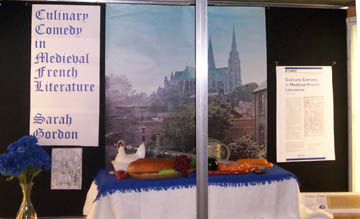Culinary Comedy in Medieval French Literature
Sarah Gordon
Long before Rabelaisian tales of gargantuan gluttony regaled early modern audiences, and centuries before pie-in-the-face gags enlivened vaudeville slapstick, medieval French poets employed food as a powerful device of humor and criticism. Food and laughter, essential elements in human existence, can be used to question the meaning of cultural conventions concerning the body and sexuality, religion, class hierarchies, and gender relations.
This book unites the cultural and literary study of representations of food and consumption with theoretical approaches to comedy, humor, and parody in late twelfth- through early-fourteenth-century French fictional verse narratives of epic chanson de geste, theater, chantefable, Arthurian verse romance, fabliau, and the beast epic of the Roman de Renart. From socially inept epic heroes to hungry knights-errant and mischievous fabliau housewives, out of the ordinary food usage embodies humor. Some knights prefer fighting with roast chicken or bread loaves rather than their swords. Specific foods such as sausages, lard, pears, nuts, or chickens provoked laughter by their mere presence in a scene.
Culinary comedy serves as both social satire and literary parody, playing with institutional social conduct and alimentary codes. Its power lies in its ability to disrupt and to reinforce the same conventions it ridicules.
“This is a terrific subject that has been very little explored, since both food and laughter have (unfairly) been considered trivial subjects unworthy of scholarly attention: I like the mixture of well-known and almost unknown material.” Barbara Bowen, author of Enter Rabelais, Laughing
“Gordon... explores how food serves as a comic device offering insights into cultural norms, preoccupations, and literary conventions.” Reference and Research Book News 1 Feb. 2007
“Well written in a lively prose style, this book will appeal equally to those interested in medieval literature and French gastronomy.”—Isabel K. Roche, Gastronomica (Spring 2008): 95-96.
"...there are certainly some tasty morsels on which to ruminate." —Daron Burrows, French Studies 62.3 (July 2008): 333-34.
"Gordon has important insights on the role of culinary comedy in the development of medieval literature and society, highlighting socio-economic change as perceived in the literary world.... Culinary Comedy is very useful not only for the food historian, but also for an individual who seeks to understand food and its role in medieval literature." —Wendy Pfeffer, French Review 81.6 (2008): 1264-65.
“…Gordon presents one very potent means of creating both humor and lessons about human and social realities. It is the incorporation into literature of references to food,… her own writing is articulate and clear; her literary criticism eschews the habitually obscure jargon of those who aren’t sure what they are trying to say. She is sure, and her book makes sense.” —Terence Scully, Speculum 83.3 (July 2008): 700-01
For further reviews, see
The Chronicle of Higher Education 15 Dec. 2006.
Pacific Ancient and Modern Language Association Newsletter 31.1 (Feb. 2007).
Sarah Gordon, Utah State University, has published on medieval literature in journals such as LIT, Medievalia et Humanistica, and Women in French. She also taught at the Sorbonne and Ohio University and was a restaurant critic in Paris.
ISBN: 978-1-55753-430-9
2006. Vol. 37. x, 220 pp. Paper $43.95

Display in Stanley Coulter Hall at Purdue University, April 24-May 1, 2006.
Information last updated June 24, 2015
For further information about this book, contact the production editor at clawsons@purdue.edu